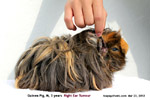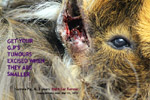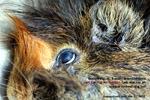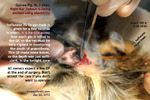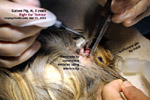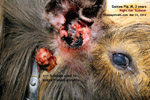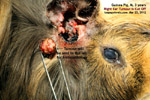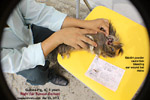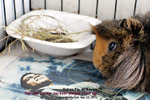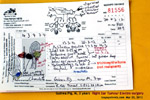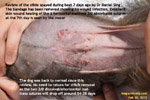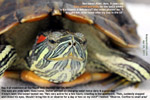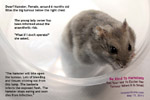The critical point is the anaesthesia. Too Little, the GP may wake up and die of fright and pain when electrodes are applied. Too much, the GP may die. Just sufficient, the GP does not feel the pain and the surgery goes smoothly.
So what anaesthesia is to be used?
In this case study with Dr Daniel, I demonstrated the electro-surgical excision of the 3-year-old male GP with a large ear tumour. This would probably be one of those rare occasions to see such an electro-surgery for him as there are few cases in GP requiring such a method. I said that scalpel cutting would not make for a clean cut, unlike electro-surgery. Talk must be shown by action and so I did it today.
3 days of antibiotics and cleaning first. Today is operation day.
ANAESTHESIA
Zoletil 100. 800 g GP.
I drew 0.05 ml Zoletil 100. Added 0.05 ml normal saline. Injected 0.1 ml IM muscle backside. Less than 5 minutes, the GP was down. He could still feel pain (forceps onto ear edge) and so isoflurane gas was given carefully for a few seconds. The trick here is to give not too much and yet not too little by mask. I checked the eye blinking reflex. Just at the point of no blinking and blinking. A twilight zone.
Isoflurane gas at 2% given to effect.
The electro-excision began. Some little noises from the GP when electro-surgery was applied but no waking up. All done within 2 minutes.
GP woke up after 30 minutes and was OK to go home to a happy gentleman owner who had brought him to Toa Payoh Vets on Saturday to see Dr Jason Teo, saying that the GP had a bite wound. It was not a bite wound but an infected ulcerated tumour.
Electrosurgery in GP and dwarf hamsters. I worry that insufficient analgesia may cause fright and heart attack. So I seldom use it too. But, in theory, the GP and dwarf hamster will not be electrocuted or die of heart attack if proper procedures and analgesia are adopted. The vet must know how to use the tools of his trade!
PART 2.
916. Follow up: Guinea Pig with right ear tumour
The case of the big ear tumour
Yesterday I text messaged the owner of the GP with right ear tumour electro-excised some days ago to tell him the good news that the tumour was not cancerous. The lab report stated trichoepithelioma. The message could not be sent. So I phoned him at 10.30 am today. He was pleased with the good news. This guinea pig did not like the miniature tomatoes as much as the companion who is one-year old. "The other GP eats 3 a day," the gentleman whom I had not met, said. "He stops eating tomatoes and I gave him cucumber slices which he eats all. Also, he likes timothy hay."
The guinea pig was well cared for and loved.
"How did he get such a big ear lump?" I asked as the vet he consulted was Dr Jason Teo who worked on Saturday when he came. I took over the surgery and anaesthesia which is quite risky for GP compared to the bigger dog or cat of similar age.
"I noticed hair loss around his right ear one month ago. Then a white swelling."
"Did the other GP bite the lump since there was bleeding and ulcers when you brought him in for treatment on Saturday?" I asked.
"I don't know but he did have bite marks on his body. So he could have been bitten by the other GP."
"He could have scratched the big lump," I said. "It could be irritating as it was heavy. Is he normal now?"
"He is OK. He eats well, drinks and is active. No blood in the urine. Clear coloured urine peed. However, sometimes he shakes his head."
This case illustrates the importance of following up post-op. The owner did not call me to report on head shaking as it was not causing the guinea pig to stop eating.
"There is something inside the ear," I said. "Some blood from the bleeding and some powder from the purple permanganate applied to the wound to stop bleeding."
"What shall I do?" he asked.
"Buy a new syringe. Fill with boiled water. Squirt a few drops into the ear canal 3X/day. Massage the ear canal to clear the blood clots and chemicals for the next 5 days. Phone me after that."
Timely treatment of the ear canal by removing the debris will prevent infection. It must be done at home a few days. But in the dog and cat, I have to do it at the Surgery if the owner can't do it well. In this GP, it is best that the owner who cares much for the GP is assessed and can do it.
Always follow up esp. on ear surgery, if possible, in this hectic paced working life in Singapore. The owner would not know about otitis externa and this would worsen in time.
 TOA
PAYOH VETS
TOA
PAYOH VETS
